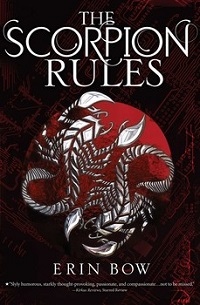| ________________
CM . . .
. Volume XXIII Number 7. . . .October 21, 2016
excerpt:
In the dystopian future of The Scorpion Rules, an artificial intelligence named Talis enforces peace by requiring every state leader to give a child as hostage. If a state goes to war, the child dies. Greta, Princess of the Pan Polar Confederacy, is a hostage being held in the Saskatchewan Prefecture. She and her fellow hostages are raised by robots and AIs and are conditioned from a young age to obedience and restraint, knowing that at any time the Swan Riders could arrive and call them to their deaths. A new hostage arrives, grandson of the newly formed Cumberland Alliance’s leader. Elian, 17 and angry, is unprepared and unwilling to play the role of hostage, and he clings to his defiance in the face of increasingly painful “conditioning”. When Greta sees what is happening to Elian, she is awakened to the truth that what happens to the children is wrong. She stands up for Elian and is punished. Things get complicated when Cumberland Alliance troops arrive to rescue Elian and take Greta to use as leverage against the Pan Pols who control Lake Ontario. Elian’s loyalties are tested, and Talis arrives in a borrowed Swan Rider body to take control of the situation. Greta’s solution to the stand-off is unexpected and risky, but her friendship and love for the other hostages gives her the courage to do whatever she has to to save them. The Scorpion Rules is a compelling, suspenseful and heartbreaking look at a frighteningly plausible future. Talis has prevented the human race from destroying itself, but relative peace is bought with the lives of children who never chose to be sacrifices. By focusing on the hostage children, Bow takes an abstract philosophical problem and makes it personal. The characters in The Scorpion Rules are vivid, realistic portrayals of children traumatized and warped by their circumstances who nevertheless assert their agency and identity in diverse, believable ways. Greta grows from stoic acceptance of her duty to impassioned defence of her friends. Her recognition of the love and care they all feel for each other allows her to see and exploit Talis’s weakness. Talis is a brilliant character—once human, now entirely artificial, he is a ruthless dictator with a sarcastic voice and a flair for drama. He provides much of the comic relief while remaining quite terrifying. Bow’s prose is spare, poetic and devastating. She builds her world with precise, sensory details that add to the suspense of every scene. Complex political scenarios are explained in terms of the individuals involved, so world-building information is also character, is also drama. The tension remains taut throughout, even in the funniest scenes involving goats and smashed pumpkins. The Scorpion Rules asks difficult questions about the justifications for violence and the cost of peace. It is a gripping, sometimes harrowing, often moving, exploration of the value of human life and the importance of individuals and their relationships. Because there is some graphic violence, including several scenes of torture, and there is a non-graphic sex scene, The Scorpion Rules is recommended for older readers. Essential for those who enjoy dystopian YA, it transcends its genre and should be read by anyone who has ever wondered whether humanity is worth saving. Highly Recommended. Kim Aippersbach is a writer, editor and mother of three living in Vancouver, BC.
To comment
on this title or this review, send mail to cm@umanitoba.ca.
Copyright © the Manitoba Library Association. Reproduction for personal
use is permitted only if this copyright notice is maintained. Any
other reproduction is prohibited without permission.
Next Review | Table of Contents For This Issue - October 21, 2016 |
